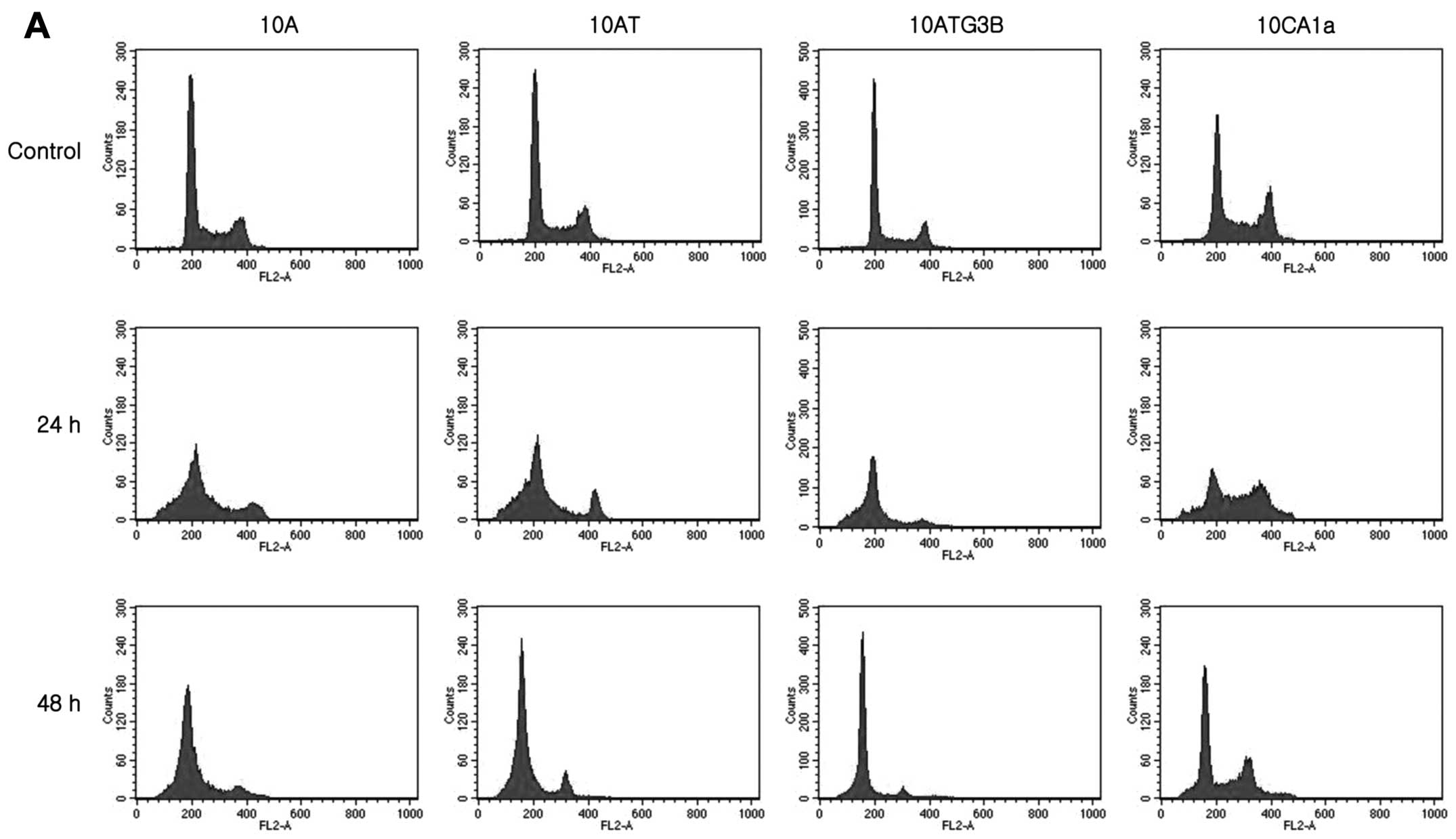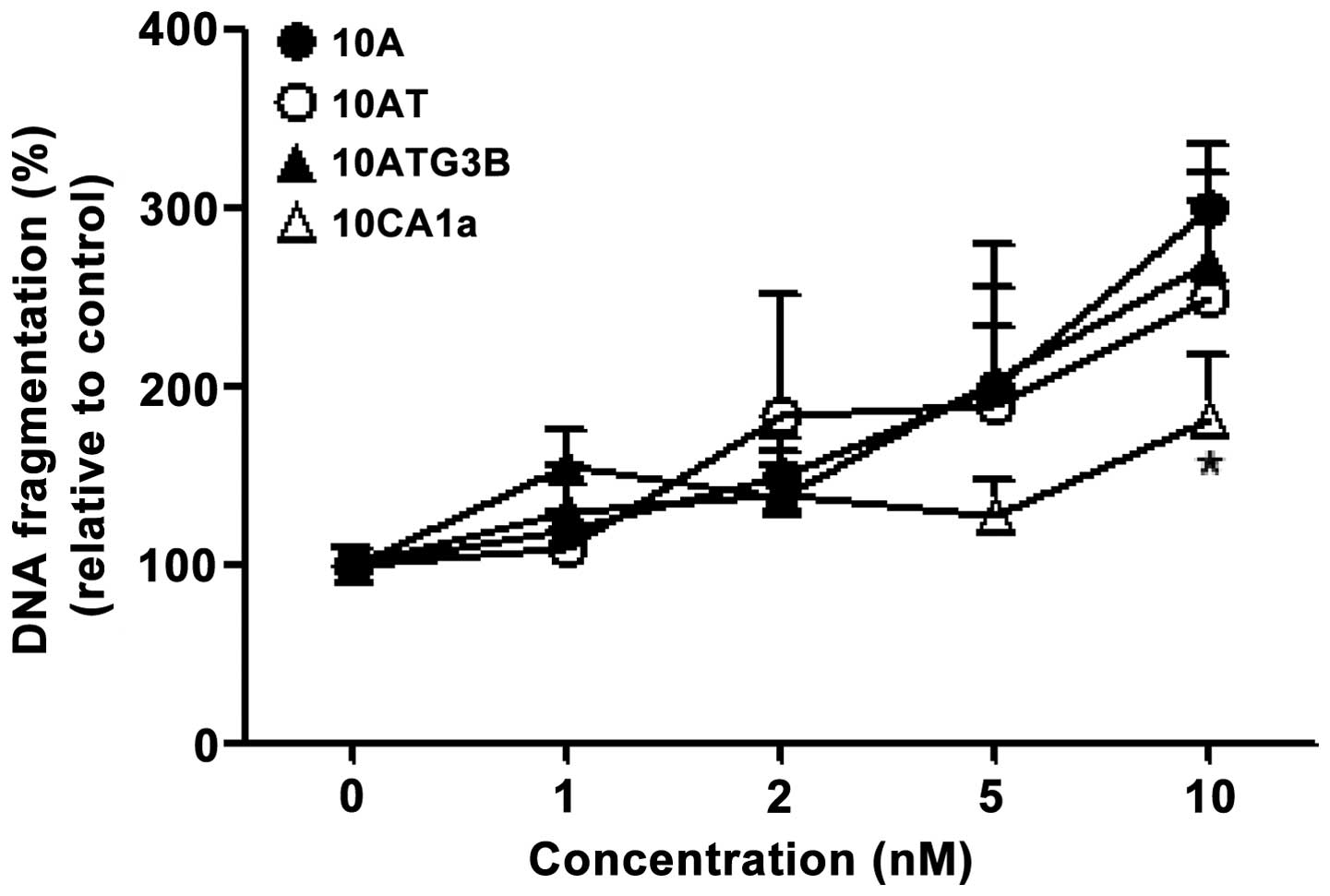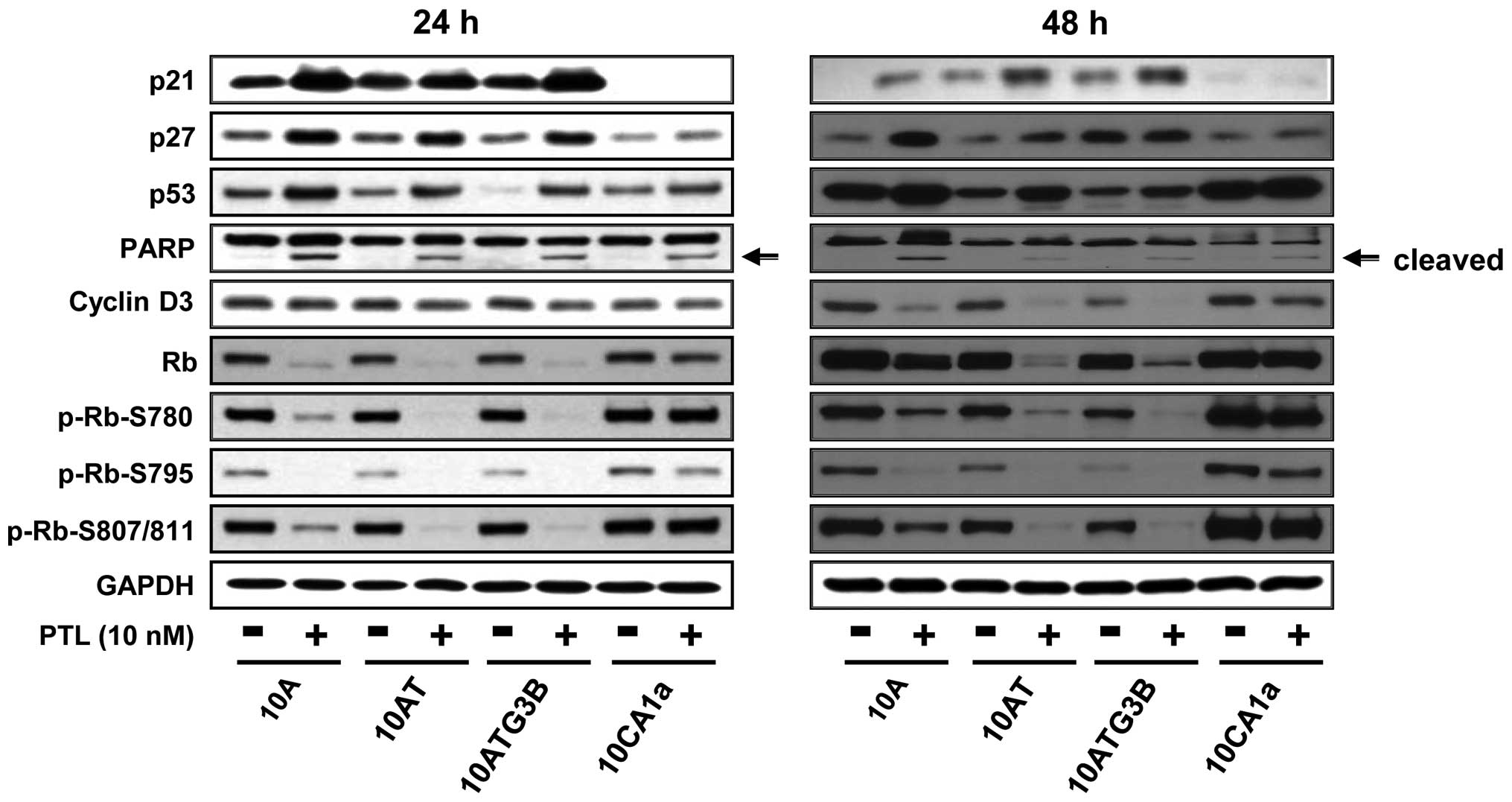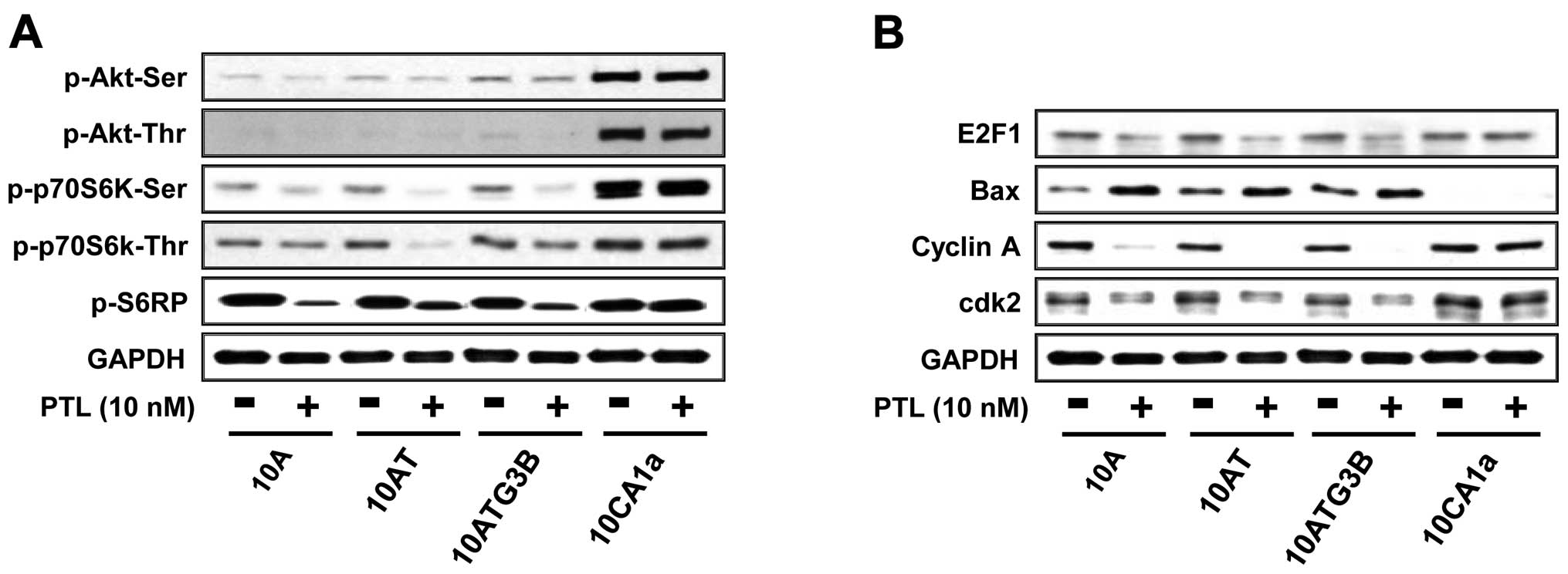|
1
|
Jemal A, Tiwari RC, Murray T, Ghafoor A,
Samuels A, Ward E, Feuer EJ and Thun MJ: Cancer statistics. CA
Cancer J Clin. 54:8–29. 2004. View Article : Google Scholar : PubMed/NCBI
|
|
2
|
Dawson PJ, Wolman SR, Tait L, Heppner GH
and Miller FR: MCF10AT: a model for the evolution of cancer from
proliferative breast disease. Am J Pathol. 148:313–319.
1996.PubMed/NCBI
|
|
3
|
Soule HD, Maloney TM, Wolman SR, Peterson
WD Jr, Brenz R, McGrath CM, Russo J, Pauley RJ, Jones RF and Brooks
SC: Isolation and characterization of a spontaneously immortalized
human breast epithelial cell line, MCF-10. Cancer Res.
50:6075–6086. 1990.PubMed/NCBI
|
|
4
|
Kim SH, Miller FR, Tait L, Zheng J and
Novak RF: Proteomic and phosphoproteomic alterations in benign,
premalignant and tumor human breast epithelial cells and xenograft
lesions: biomarkers of progression. Int J Cancer. 124:2813–2828.
2009. View Article : Google Scholar : PubMed/NCBI
|
|
5
|
Kim SH, Zukowski K and Novak RF: Rapamycin
effects on mTOR signaling in benign, premalignant and malignant
human breast epithelial cells. Anticancer Res. 29:1143–1150.
2009.PubMed/NCBI
|
|
6
|
Jordan MA: Mechanism of action of
antitumor drugs that interact with microtubules and tubulin. Curr
Med Chem Anticancer Agents. 2:1–17. 2002. View Article : Google Scholar
|
|
7
|
Guéritte F: General and recent aspects of
the chemistry and structure-activity relationships of taxoids. Curr
Pharm Des. 7:1229–1249. 2001. View Article : Google Scholar : PubMed/NCBI
|
|
8
|
Ramanathan B, Jan KY, Chen CH, Hour TC, Yu
HJ and Pu YS: Resistance to paclitaxel is proportional to cellular
total antioxidant capacity. Cancer Res. 65:8455–8460. 2005.
View Article : Google Scholar : PubMed/NCBI
|
|
9
|
Fuchs DA and Johnson RK: Cytologic
evidence that taxol, an antineoplastic agent from Taxus brevifolia,
acts as a mitotic spindle poison. Cancer Treat Rep. 62:1819–1222.
1978.
|
|
10
|
Lin HL, Liu TH, Chau GY, Lui WY and Chi
CW: Comparison of 2-methoxyestradiol-induced, docetaxel-induced,
and paclitaxel-induced apoptosis in hepatoma cells and its
correlation with reactive oxygen species. Cancer. 89:983–994. 2000.
View Article : Google Scholar : PubMed/NCBI
|
|
11
|
Dziadyk JM, Sui M, Zhu X and Fan W:
Paclitaxel-induced apoptosis may occur without a prior
G2/M-phase arrest. Anticancer Res. 24:27–36.
2004.PubMed/NCBI
|
|
12
|
Zhou J and Giannakakou P: Targeting
microtubules for cancer chemotherapy. Curr Med Chem Anticancer
Agents. 5:65–71. 2005. View Article : Google Scholar : PubMed/NCBI
|
|
13
|
McGrogen BT, Gilmartin B, Carney DN and
McCann A: Taxanes, microtubules and chemoresistant breast cancer.
Biochim Biohys Acta. 1785:96–132. 2008.
|
|
14
|
Villeneuve DJ, Hembruff SL, Veitch Z,
Cecchetto M, Dew WA and Parissenti AM: cDNA microarray analysis of
isogenic paclitaxel- and doxorubicin-resistant breast tumor cell
lines reveals distinct drug-specific genetic signatures of
resistance. Breast Cancer Res Treat. 96:17–39. 2006. View Article : Google Scholar
|
|
15
|
Starcevic SL, Elferink C and Novak RF:
Progressive resistance to apoptosis in a cell lineage model of
human proliferative breast disease. J Natl Cancer Inst. 93:776–782.
2001. View Article : Google Scholar : PubMed/NCBI
|
|
16
|
Starcevic SL, Diotte NM, Zukowski KL,
Cameron MJ and Novak RF: Oxidative DNA damage and repair in a cell
lineage model of human proliferative breast disease (PBD). Toxicol
Sci. 75:74–81. 2003. View Article : Google Scholar : PubMed/NCBI
|
|
17
|
Basolo F, Elliott J, Tait L, Chen XQ,
Maloney T, Russo IH, Pauley R, Momiki S, Caamano J, Klein-Szanto
AJ, et al: Transformation of human breast epithelial cells by
c-Ha-ras oncogene. Mol Carcinog. 4:25–35. 1991. View Article : Google Scholar : PubMed/NCBI
|
|
18
|
Russo J, Tait L and Russo IH:
Morphological expression of cell transformation induced by c-Ha-ras
oncogene in human breast epithelial cells. J Cell Sci. 99:453–463.
1991.PubMed/NCBI
|
|
19
|
Santner SJ, Dawson PJ, Tait L, Soule HD,
Eliason J, Mohamed AN, Wolman SR, Heppner GH and Miller F:
Malignant MCF10CA1 cell lines derived from premalignant human
breast epithelial MCF10AT cells. Breast Cancer Res Treat.
65:101–110. 2001. View Article : Google Scholar : PubMed/NCBI
|
|
20
|
Liu S, Wu D, Li L, Sun X, Xie W and Li X:
NF-κB activation was involved in reactive oxygen species-mediated
apoptosis and autophagy in
1-oxoeudesm-11(13)-eno-12,8α-lactone-treated human lung cancer
cells. Arch Pharm Res. 37:1039–1052. 2014. View Article : Google Scholar
|
|
21
|
Zhan Y, Chen Y, Liu R, Zhang H and Zhang
Y: Potentiation of paclitaxel activity by curcumin in human breast
cancer cell by modulating apoptosis and inhibiting EGFR signaling.
Arch Pharm Res. 37:1086–1095. 2014. View Article : Google Scholar
|
|
22
|
Lee EJ, Park MK, Kim HJ, Kang JH, Kim YR,
Kang GJ, Byun HJ and Lee CH: 12-O-Tetradecanoylphorbol-13-acetate
induces keratin 8 phosphorylation and reorganization via expression
of transglutaminases-2. Biomol Ther. 22:122–128. 2014. View Article : Google Scholar
|
|
23
|
Zhang L, Wei Y, Pushel I, Heinze K,
Elenbaas J, Henry RW and Arnosti DN: Integrated stability and
activity control of the Drosophila Rbf1 retinoblastoma protein. J
Biol Chem. 289:24863–24873. 2014. View Article : Google Scholar : PubMed/NCBI
|
|
24
|
Fresno Vara JA, Casado E, de Castro J,
Cejas P, Belda-Iniesta C and González-Barón M: PI3K/Akt signaling
pathway and cancer. Cancer Treat Rev. 30:193–204. 2004. View Article : Google Scholar : PubMed/NCBI
|
|
25
|
Kong HJ, Yu HJ, Hong S, Park MJ, Choi YH,
An WG, Lee JW and Cheong J: Interaction and functional cooperation
of the cancer-amplified transcriptional coactivator activating
signal cointegrator-2 and E2F-1 in cell proliferation. Mol Cancer
Res. 1:948–958. 2003.PubMed/NCBI
|
|
26
|
Kim CW, Lu JN, Go SI, Jung JH, Yi SM,
Jeong JH, Hah YS, Han MS, Park JW, Lee WS and Min YJ: p53
restoration can overcome cisplatin resistance through inhibition of
Akt as well as induction of Bax. Int J Oncol. 43:1495–1502.
2013.PubMed/NCBI
|
|
27
|
Sezgin C, Karabulut B, Uslu R, Sanli UA,
Goksel G, Zekioglu O, Ozdemir N and Goker E: Potential predictive
factors for response to weekly paclitaxel treatment in patients
with metastatic breast cancer. J Chemother. 17:96–103. 2005.
View Article : Google Scholar : PubMed/NCBI
|
|
28
|
Schmidt M, Bachhuber A, Victor A, Steiner
E, Mahlke M, Lehr HA, Pilch H, Weikel W and Knapstein P: p53
expression and resistance against paclitaxel in patients with
metastatic breast cancer. J Cancer Res Clin Oncol. 129:295–302.
2003.PubMed/NCBI
|
|
29
|
Waldman T, Kinzler KW and Vogelstein B:
p21 is necessary for the p53-mediated G1 arrest in human
cancer cells. Cancer Res. 55:5187–5190. 1995.PubMed/NCBI
|
|
30
|
Knuefermann C, Lu Y, Liu B, Jin W, Liang
K, Wu L, Schmidt M, Mills GB, Mendelsohn J and Fan Z:
HER2/PI-3K/Akt activation leads to a multidrug resistance in human
breast adenocarcinoma cells. Oncogene. 22:3205–3212. 2003.
View Article : Google Scholar : PubMed/NCBI
|
|
31
|
Clark AS, West K, Streicher S and Dennis
PA: Constitutive and inducible Akt activity promotes resistance to
chemotherapy, trastuzumab, or tamoxifen in breast cancer cells. Mol
Cancer Ther. 1:707–717. 2002.PubMed/NCBI
|
|
32
|
Chang F, Lee JT, Navolanic PM, Steelman
LS, Shelton JG, Blalock WL, Franklin RA and McCubrey JA:
Involvement of the P13K/Akt pathway in cell cycle progression,
apoptosis, and neoplastic transformation: a target for cancer
chemotherapy. Leukemia. 17:590–603. 2003. View Article : Google Scholar : PubMed/NCBI
|
|
33
|
Page C, Lin HJ, Jin Y, Castle VP, Nunez G,
Huang M and Lin J: Overexpression of Akt/AKT can modulate
chemotherapy-induced apoptosis. Anticancer Res. 20:407–416.
2000.PubMed/NCBI
|
|
34
|
Hu L, Hofmann J, Lu Y, Mills GB and Jaffe
RB: Inhibition of phosphatidylinositol 3′-kinase increases efficacy
of paclitaxel in in vitro and in vivo ovarian cancer models. Cancer
Res. 62:1087–1092. 2002.PubMed/NCBI
|
|
35
|
Shingu T, Yamada K, Hara N, Moritake K,
Osago H, Terashima M, Uemura T, Yamasaki T and Tsuchiya M:
Synergistic augmentation of antimicrotubule agent-induced
cytotoxicity by a phosphoinositide 3-kinase inhibitor in human
malignant glioma cells. Cancer Res. 63:4044–4047. 2003.PubMed/NCBI
|
|
36
|
Nguyen DM, Chen GA, Reddy R, Tsai W,
Schrump WD, Cole G Jr and Schrump DS: Potentiation of paclitaxel
cytotoxicity in lung and esophageal cancer cells by pharmacologic
inhibition of the phosphoinositide 3-kinase/protein kinase B
(Akt)-mediated signaling pathway. J Thorac Cardiovasc Surg.
127:365–375. 2004. View Article : Google Scholar : PubMed/NCBI
|
|
37
|
Cheng JQ, Lindsley CW, Cheng GZ, Yang H
and Nicosia SV: The Akt/PKB pathway: molecular target for cancer
drug discovery. Oncogene. 24:7482–7492. 2005. View Article : Google Scholar : PubMed/NCBI
|




















